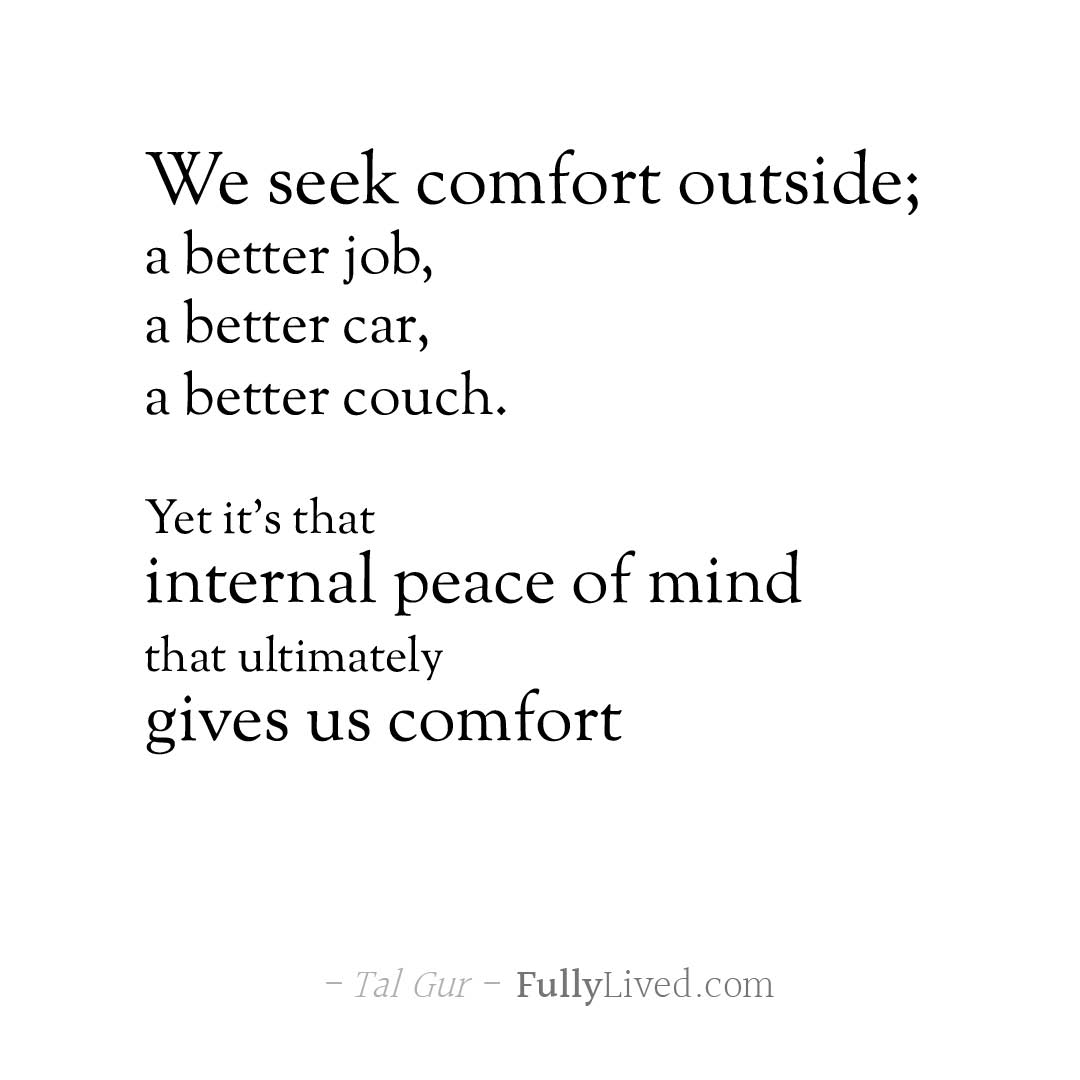We seek comfort outside; a better job, a better car, a better couch. Yet it’s that internal peace of mind that ultimately gives us comfort.
Have you ever found yourself chasing after the next big thing, believing it will bring you the comfort and contentment you seek? Maybe it's that promotion at work, the sleek new car, or perhaps the allure of a plush, designer couch. We're often convinced that external upgrades will provide the solace and satisfaction we crave. Yet, in the pursuit of these material comforts, we overlook a fundamental truth: true contentment stems not from what we possess externally, but from the internal landscape of our minds.
Picture this: you're in a bustling city, surrounded by towering skyscrapers and bustling streets. Each building represents a different facet of your life - your job, your possessions, your relationships. They all contribute to the grand skyline of your existence. Yet, amidst this urban jungle, there lies a serene garden, hidden away from the chaos of the outside world. This garden symbolizes your inner peace, your mental sanctuary. While the city may offer excitement and novelty, it's in this tranquil oasis where true comfort resides.
Think about it. How often have you upgraded your possessions, only to find that the initial thrill fades quickly, leaving you craving the next shiny object? It's a cycle of desire and dissatisfaction that many of us fall victim to. But what if, instead of constantly seeking external validation, we turned our attention inward? What if we cultivated a sense of inner peace that transcended the fleeting pleasures of materialism?
Imagine your mind as a vast ocean, constantly ebbing and flowing with the tides of emotion. At times, the waters may be turbulent, stirred up by stress, worry, and discontent. Yet beneath the surface turmoil lies a deep reservoir of tranquility, waiting to be tapped into. This reservoir represents your inherent capacity for inner peace - a source of comfort that remains untouched by the external world.
Consider the wisdom of ancient philosophers who espoused the virtues of inner tranquility. Stoic thinkers like Marcus Aurelius and Epictetus believed that true happiness could only be found by mastering one's own mind. They understood that external circumstances were beyond our control, but our internal reactions to those circumstances were within our power. In essence, they recognized that while we may not be able to change the world around us, we can certainly change our perception of it.
Now, I'm not suggesting that we forsake all external comforts in favor of a monk-like existence. It's perfectly natural to enjoy the pleasures of life and to strive for success in our endeavors. However, we mustn't place undue emphasis on these external trappings, believing that they alone hold the key to our happiness. Instead, let us cultivate a sense of gratitude for what we have, while also nurturing our inner landscape through practices like mindfulness, meditation, and self-reflection.
In the end, it's not the size of our bank account or the brand of our car that brings us lasting comfort; it's the peace of mind that comes from within. So the next time you find yourself yearning for external validation, take a moment to pause and look inward. You may just find that the greatest comfort of all has been within you all along.
Now, ask yourself: What small step can I take today to cultivate more inner peace in my life?
* To gain more inspiration and motivation for your personal growth journey, I recommend visiting my SMART goals page, which offers a wide range of goal ideas to help you establish new aspirations and achieve greater success in life. This list was crucial in the development of my own life goals list, consisting of 100 goals that I pursued for ten years.
Chief Editor
 Tal Gur is an author, founder, and impact-driven entrepreneur at heart. After trading his daily grind for a life of his own daring design, he spent a decade pursuing 100 major life goals around the globe. His journey and most recent book, The Art of Fully Living, has led him to found Elevate Society.
Tal Gur is an author, founder, and impact-driven entrepreneur at heart. After trading his daily grind for a life of his own daring design, he spent a decade pursuing 100 major life goals around the globe. His journey and most recent book, The Art of Fully Living, has led him to found Elevate Society.























